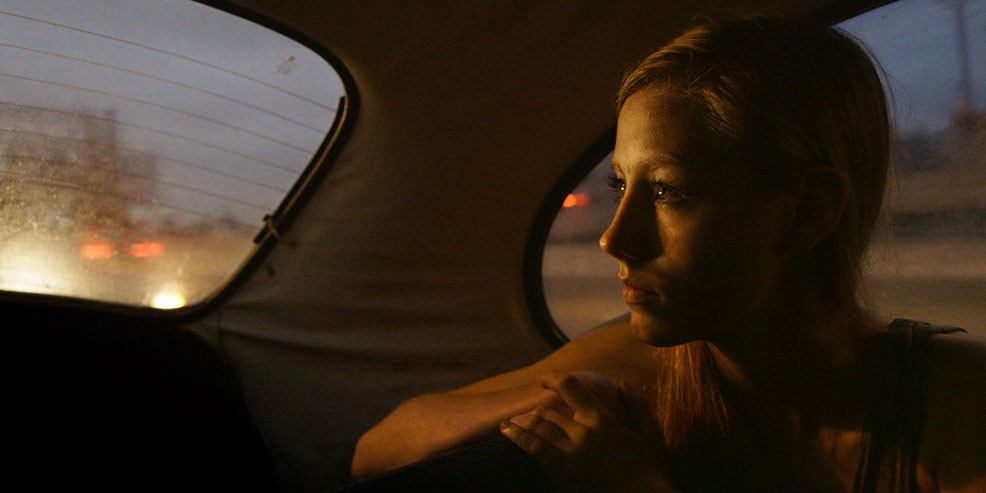Micah Magee graduated from the University of Texas with a dual degree in Plan II Honors and Radio-Television-Film. In addition to making films, Magee worked as managing and programming director of Austin’s Cinematexas International Short Film Festival, pirate-radio programmer, and print journalist. In 2001 she received a Fulbright Fellowship for Journalism to Berlin, Germany, where she attended directing studies at the German Film and Television Academy in Berlin (DFFB). Magee has received artist awards from NYFA and NYSCA. Her films have received awards from the Oberhausen Short Film Festival and Premiers Plans d’Angers and have been screened at festivals, museums, and galleries worldwide. (Petting Zoo’s official website)
“Petting Zoo” will premiere at the 2015 SXSW Film Festival on March 14.
W&H: Please give us your description of the film playing.
MM: “Petting Zoo” is the portrait of a young woman coming into her
own in an environment that does not always present ideal circumstances.
W&H: What drew you to this story?
MM: I grew up in San Antonio, and I wanted to portray the details
I miss — its rich South Texas culture and layers of harshness and beauty. We filmed
in places where my teenage cousins still live now: high schools built by prison
architects, trailers, rock bars, abandoned half-built subdivisions, the
corporate parks between the fields.
I worked with locally cast non-actors to explore elements of
coming of age in such a place. I wanted to re-find a certain particular feeling, like when you wake up and are not sure if you are forgetting who you really
are. Maybe you are really more real someplace else, and you are forgetting the
most important thing. What is that most important thing? A feeling that
something is slipping away from you. Or the feeling that life is hurtling you
through time and space in a direction you aren’t sure you want to be going.
I was also interested in a particular experience of body and
vulnerability. Sometimes people, girls especially, use sex as a tool to find companionship and to avoid loneliness. I think through the lack of sex education in Texas, a lot
of teens where I come from are left alone with the consequences of sexual
exploration and find themselves excluded and labeled at a time when they most
need community and support. When you are a teenager, you are just beginning to
know your body. As a pregnant teen, your relationship to your body changes all
over again.
W&H: What was the biggest challenge in making the film?
MM: The biggest challenge — rattlesnakes, fire ants, and sun stroke aside — was communication. Your film is
the sum of everything you put into it, so if you want your film to be honest,
you have to fight for the construction of the film to be honest and
straightforward too.
W&H: What do you want people to think about when they are leaving the theatre?
MM: I hope they will feel empowered and in touch with themselves.
W&H: What advice do you have for other female directors?
MM: For me, it was most important to follow my own personal
interest, especially while casting, rather than to find someone who could
represent the role for other people. When personal, possibly feminine tastes conflict with other folks’ expectations, I think it is important to take
time out and listen to yourself. Staying in my own time and tempo was important.
I am a three-time mom, so to make films I have to vehemently reject a quite
entrenched production model that deals with time differently than is good for
me and my work. I don’t know if this is especially true for women, but it might
be.
W&H: How did you get your film funded?
MM: Overall, it was a slow process, and we relied a lot on
sponsorship, a small and generous crew who worked on deferral, and doing things
ourselves if we couldn’t pay anyone else to do it. Our cash funding was a mix of
crowdfunding, subsidized loans, and grants from arts foundations. I probably
wrote about thirty grant applications. While this was great pre-production
preparation, nothing came of it financially until 2011, when I got a
screenwriting award from the New York Foundation for the Arts. Then NYSCA came
through with a wonderfully generous production grant. When I read the letter, I
jumped around screaming for about ten minutes, because this was when I knew we
would be making the film.
Those funds got us back to San Antonio to start
looking for cast and locations. Michael Weber of The Match Factory came
on as the main producer and sales agent with Medienboard funding. A grant from
the Austin Film Society closed our post-production budget. Kickstarter was
great not only for raising money, but for finding an extended network of people
who cared about the topics in the film and wanted to support discussion and
change.
W&H: Name your favorite woman-directed film and why.
MM: Miranda July’s film “Nest of Tens,” because of the wig on the wall.







